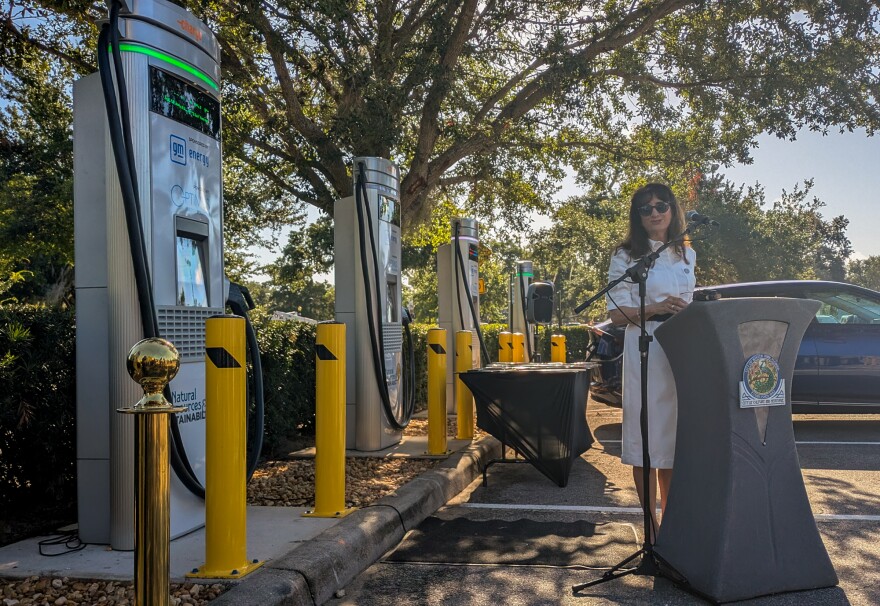Winter Park just installed seven rapid electric vehicle chargers at the city's new, so-called "mobility hub" right next to the SunRail station on West Morse Boulevard.
The rapid chargers provide "best-in-class EV charging, as compared to the single, slow charging station that was once here," said Gloria Eby, director of natural resources and sustainability at Winter Park.
City officials say they also plan to install two chargers for electric scooters and bicycles at the hub soon. While e-scooters and e-bikes aren't allowed on nearby Park Avenue, they are encouraged for use on adjacent streets, according to the city.
RELATED: New charging station accelerates Orange County's push for greener transportation
The city received the new EV chargers as a donation from Optimus Energy Solutions, a renewable energy company based in Mount Dora. President and founder Ben Pauluhn said from signing the contract to getting the chargers built and fully operational, the process took about three-and-a-half months.
"That's what it should be, because everyone's rowing in the same direction. Everyone's working together," Pauluhn said. "So from a pure partnership standpoint: it works, it works, it works. People just have to say yes and go."
The private-public partnership is key to Winter Park's goal of building out "an industry-leading, multimodal transportation hub," with options for people who drive cars and rely on public transit, according to Eby.

Winter Park's new EV chargers arrive at a critical moment for clean energy in the United States. The country stands to lose major ground on achieving clean energy goals, as a slew of federal tax incentives begin sunsetting under President Donald Trump's new tax-spending package, dubbed the "One Big Beautiful Bill."
Given the rollbacks, the U.S. will now likely drop emissions by just 3% by the end of this decade, compared to the 40% goal set by former President Joseph Biden's administration, according to one analysis.
RELATED: Some say proposed clean energy rollbacks could send local businesses into "survival mode"
Central Floridians working across the renewable energy industry, including Pauluhn, have expressed concerns about the bill. Before the final version of it became law, Pauluhn said he was especially worried about a provision in the bill that would've required any projects benefiting from a commercial solar energy tax credit to begin construction within 60 days of the bill's enactment.
Such a sudden disruption, Pauluhn said then, would cause "meaningful pain to people, communities and businesses that is probably not necessary." Ultimately, to his relief, that provision was removed from the final version of the bill.
"The final version was far better than the interim version. Obviously, the final version is terrible, compared to the previous baseline," Pauluhn said. For residential solar, he said the outlook is still grim, with rollbacks likely to kill many jobs throughout the state.

Some polls indicate strong bipartisan support for federal clean energy incentives implemented by the Biden administration, including among 78% of people who voted for Trump in 2020.
But with the new tax-spending package now in place, rollbacks of those clean energy incentives are set to begin quickly. Tax credits reducing the cost of electric vehicles are set to end September 30.
A federal judge last month ordered the Trump administration to unfreeze funding for states to build EV chargers. But the new tax-spending package ends a "30C" tax credit currently helping offset the cost of building EV chargers in certain locations. That incentive expires at the end of next June.
"Even if you're not going to file for these tax credits, the clean energy credits are helping to lower energy costs for everyone," Dory Larsen, Senior Electric Transportation Program Manager for the Southern Alliance for Clean Energy, said in May. "That makes a huge difference in the cost of goods.
"Businesses have to pay energy costs as well …. Those increased energy costs for businesses are going to be passed on to consumers," Larsen said.

For Pauluhn, politics are not the main focus. What he wants to see is market predictability, Pauluhn said — and as federal incentives fade, "it gives a real market certainty to private businesses like us."
"If you say yes, then private capital, private ideas, private excitement and energy flows into it, and neat stuff happens," Pauluhn said. "If we say yes, the best technologies win. And the best consumer experience is based around electrification."
Democratic State Representative Anna Eskamani, who represents Winter Park, joined a recent ribbon-cutting ceremony at the new mobility hub. She said beyond it being a "fantastic private-public partnership," the hub's new rapid EV chargers represent a promise kept to Floridians across the political spectrum.
"We're responding to what consumers are asking us to do," Eskamani said. "Despite the political climate and the rhetoric coming from some politicians, the reality is, on the ground, everyday Floridians want charging stations; they want solar; they want alternatives to fossil fuels."
Rewiring America has an online tool to help people search for federal, state, local and utility company incentives for which they're qualified.
Copyright 2025 Central Florida Public Media



